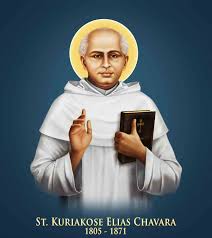CHAVARA: The Spiritual Path of St. Kuriakose Elias Chavara
St. Kuriakose Elias Chavara, a beloved 19th-century saint from Kerala, India, lived a life of devotion, service, and deep faith that has continued to inspire generations of Christians. His spirituality offers a model for following Jesus through a life of holiness, humility, and commitment to community. By adopting the acronym CHAVARA, we can summarize the key aspects of his teachings, providing a pathway for the faithful to deepen their faith and walk more closely in the footsteps of Christ.
C - Commitment to Holiness
St. Chavara believed personal holiness was foundational for Christian
life, encouraging believers to “be holy and lead others to holiness.” His Testament
of a Loving Father urges Christians to pursue sanctity as an example to
others, mirroring Jesus’ call to His followers to “be perfect, as your heavenly
Father is perfect” (Matthew 5:48). His emphasis on inner transformation and
closeness with God remains central to his spiritual legacy.
H - Humble Service to Others
Inspired by Jesus' teaching to serve “the least of these” (Matthew
25:40), St. Chavara dedicated his life to serving the marginalized and uplifted
the disadvantaged by establishing schools, orphanages, and social centers. His
acts of charity were not merely gestures of help but reflections of Jesus’
compassion, a reminder that following Christ means a life of service and
selflessness.
A - Adoration and Eucharistic Devotion
St. Chavara’s spirituality was deeply Eucharistic, with a devotion to the
presence of Christ in the Eucharist that provided him strength and guidance.
His writings emphasize the importance of adoration, reflecting Jesus’
invitation to “remain in me” (John 15:4). He spent significant time in prayer
before the Blessed Sacrament, finding in this communion with Jesus a source of
inspiration for his mission and ministry.
V - Vision of Transformation Through
Education
Education was at the heart of St. Chavara’s mission. He believed in the
transformative power of knowledge as a means to uplift individuals and
communities. This vision led him to establish Kerala’s first Catholic school,
with the conviction that education cultivates both wisdom and virtue. His
approach reflects the biblical call for growth in knowledge and wisdom
(Proverbs 1:5) and shows how spiritual transformation is supported by
intellectual development.
A - Absolute Devotion to Mary
St. Chavara’s devotion to Mary, the Mother of Jesus, played a central
role in his spirituality. He saw Mary as an ideal model of obedience and faith,
often entrusting his personal and communal needs to her care. His devotion to
Mary, who fully accepted God’s plan (Luke 1:38), reflects his desire to follow
her example of humility and surrender to God’s will.
R - Rootedness in Community and Family
Life
One of the most cherished aspects of St. Chavara’s spirituality is his
vision of family and community as “domestic churches.” He believed that the
home was where faith should be practiced daily and viewed strong family values
as the foundation of a faith-filled life. His Testament of a Loving Father
provides guidance for families to live out Christian virtues, reflecting the
teaching of St. Paul: “Bear with each other and forgive one another”
(Colossians 3:13-14).
A - Apostolic Zeal for Evangelization
Although he remained within Kerala, St. Chavara’s heart burned with
missionary zeal. He saw his work in education and social upliftment as ways to
share the Gospel, and he established religious congregations to continue this
work. His zeal embodies Jesus' Great Commission to “go and make disciples of
all nations” (Matthew 28:19). St. Chavara believed that living a
Christ-centered life in both word and deed was a powerful form of
evangelization.
Conclusion
The CHAVARA acronym—Commitment to Holiness, Humble Service,
Adoration, Vision of Transformation through Education, Absolute Devotion to
Mary, Rootedness in Community and Family Life, and Apostolic Zeal for
Evangelization—captures the essence of St. Chavara’s spirituality. His life and
writings, especially his Testament of a Loving Father, continue to
inspire Christians to live with devotion, humility, and compassion. By
following this path, the faithful can nurture a deeper relationship with Jesus
and embody His love in every aspect of life. St. Chavara’s legacy shows us that
true discipleship is both contemplative and active, rooted in love for God and
service to others.




No comments:
Post a Comment